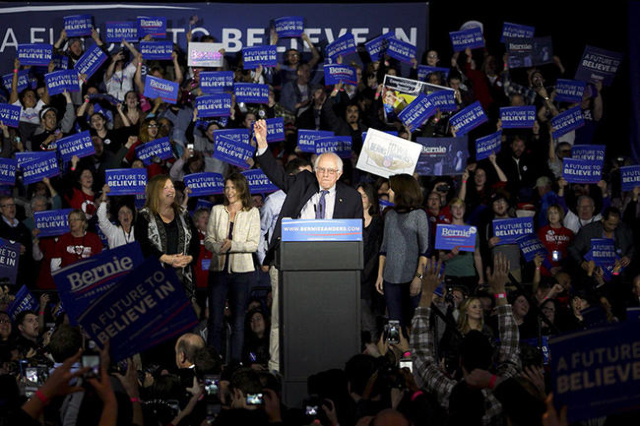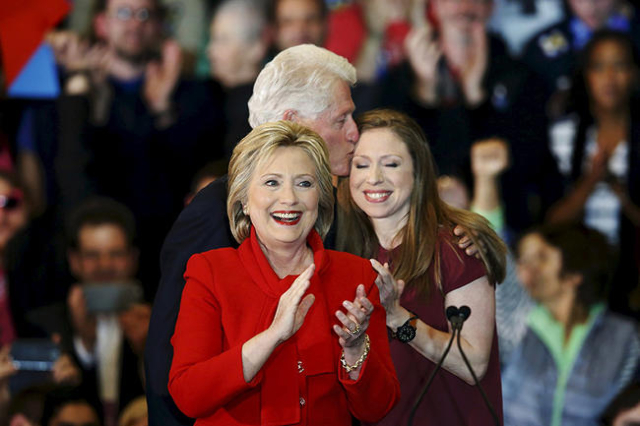Close finish shows Democrats closely divided
We're not supposed to read too much into the results of Iowa's first-in-the-nation caucus, but if ever a numerical result mirrored a national mood, Tuesday's did.
The official result on the Democratic side: Hillary Clinton, 49.9 percent. Bernie Sanders, 49.6 percent. She ended up with 23 of the state's delegates, while he snagged 21.
Clinton followed her micro-victory with a self-described "big sigh of relief."
"I know that we may have differences of opinion about how best to achieve our goals," Clinton said. "But I believe we have a very clear idea that the Democratic Party and this campaign stands for what is best in America. And we have to be united."
Ah, but that's just the thing. The Democratic Party is not united, and the disagreements are not just over tactics but goals. In fact, as Iowa showed with near-exact precision, Democrats are still split between Clinton's establishment pragmatism and Sanders' radical revolutionary fervor. (To be sure, Clinton beat Sanders handily with people 45 years old and older, but Sanders took a huge percentage of the 17-44 year old vote.)
Clinton's declaration that "I am a progressive who gets things done for people" was reportedly greeted with boos at Sanders' Iowa headquarters, and skepticism everywhere else. And her promise to finish the job of bringing universal health care to every man, woman and child in America was somewhat surprising, given her campaign's attacks on Sanders for advocating a single-payer, Medicare-for-all system that would do exactly that.
Meanwhile, Sanders delivered a modified version of the stump speech that has served him well so far, or at least well enough to go from single-digit polling to within 0.3 percentage points of defeating a well-organized political machine.
And now, on to New Hampshire. Real Clear Politics' polling average gives Sanders 55.8 percent to Clinton's 37.7 percent. Four of the six polls used to calculate that result have Sanders up over Clinton by double-digits.
And you know what that means, right?
If you said something about Clinton's anticipated victory in South Carolina's Feb. 27 Democratic primary (Real Clear Politics average: Clinton 62 percent versus Sanders 32.5 percent), you must be a member of the national media industrial complex. They tend to forget Nevada's Feb. 20 caucus.
And now, it appears we'll be a tiebreaker!
And while nobody thinks the vote will be as close as Iowa, don't forget what happened back in 2008. That year, Clinton's organized campaign defeated a little-known U.S. senator by the name of Barack Obama, 50.8 percent to 45.1 percent. That race, too, was characterized by a pragmatic Clinton accusing an idealistic Obama of being naive about the ways of Washington, D.C., and his chances for unifying the country behind an agenda for change that included health care insurance reform.
Who could forget her famous speech of Feb. 25, 2008, a rare glimpse of political sarcasm? "Now I could stand up here and say, 'Let's get everybody together, let's get unified,' the sky will open, the light will come down, celestial choirs will be singing, and everyone will know we should do the right thing and the world will be perfect," she told a Rhode Island rally.
Today, Clinton is running as the inheritor of Obama's legacy, and Sanders as a candidate who has criticized the president for failing to effectively use the coalition he assembled in 2008 to achieve even more. Sanders promises — in his own bit of steely eyed realism — not to make the same mistake with his political revolution.
That's the choice Nevada Democrats will face in exactly 17 days. And assuming they both have one win each at that point, the rest of the country will be paying attention.
— Steve Sebelius is a Review-Journal political columnist and co-host of the show "PoliticsNOW," airing at 5:30 p.m. Sundays on 8NewsNow. Follow him on Twitter (@SteveSebelius) or reach him at 702-387-5276 or SSebelius@reviewjournal.com.























